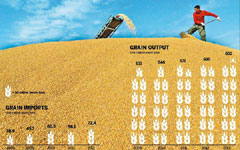Chinese mills therefore are willing to buy cheaper US wheat to reduce their flour costs and tackle the rising costs of labor, energy prices and logistics services, instead of buying the same products from the domestic market.
|
 |
|
 |
The Agricultural Development Bank of China so far has provided 735 billion yuan of loans for farm product companies to build grain inventory infrastructure across the country to ensure the nation's grain security, but the effort is regarded as inadequate by some.
A total of 15 million metric tons of grain in China's main grain-producing province Heilongjiang haven't been found proper storehouses so far this year, and a large amount of corn is stacked in open stocking areas. The province still holds 500,000 and 3.5 million metric tons of grain stored in 2010 and 2011 respectively.
"The government must improve monitoring of the amount of its grain storage and grain price levels to keep domestic demand and supply in balance," said Bai Xianjin, director of the Nanning-based Guangxi Academy of Agricultural Science and a CPPCC member.
Bai said policymakers should not only consider how to encourage farmers to plant more agricultural products but also prepare practical solutions for keeping any surplus and reserve grains in a safe and efficient manner.
China's grain imports unlikely to surge
